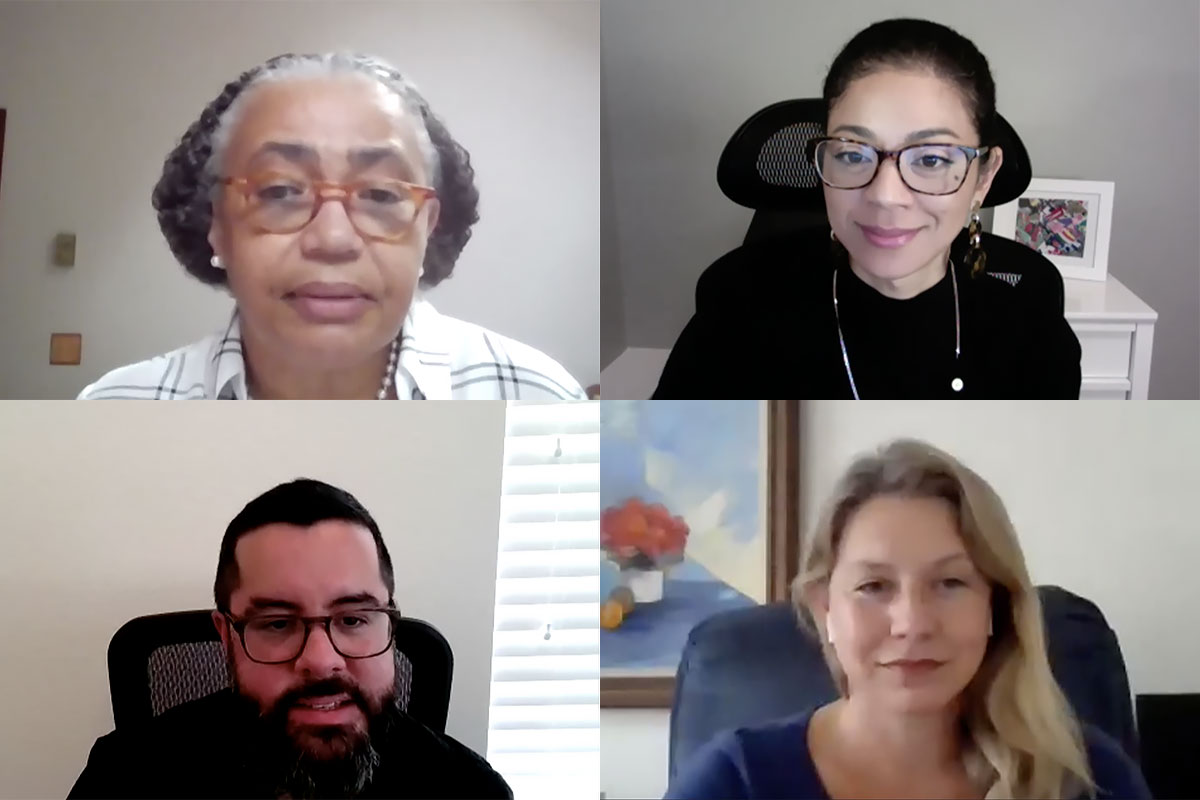The right to vote in has been a fraught issue in American history. Slaves were excluded from voting even as the Constitutional Convention of 1787 ratified that three-fifths of the slave population would be counted for determining direct taxation and representation in the House of Representatives. Women did not win the right to vote until 1920, and poll taxes and brutal intimidation were widely inflicted on black voters through much of the 20th century.
Invoking that history, Teachers College’s 2020 Constitution Day program, “Honoring Good Trouble: Ending Voter Suppression," was dedicated to the life and legacy of John Lewis, the civil rights legend and Georgia congressman who died in July.
U.S. Constitution Day - Honoring “Good Trouble”: Ending Voter Suppression
Moderator Sonya Douglass Horsford, Associate Professor of Education Leadership and Founding Director of TC’s Black Education Research Collective (BERC), set the tone for the event — held on September 17th, the day the Founding Fathers ratified the Constitution in Philadelphia — asking at the outset: "How confident are you that we will have a clean election in which the integrity of the voting process will be assured?"
The overall response was that, thanks to the sacrifices of Lewis and others, the system works.
I think we can be confident that if we cast ballots, they will be counted and that we can get transparent information and accurate, transparent results on what occurs on Election Day.
— Julie Ebenstein, Senior Staff Attorney for the ACLU Voting Rights Project
“I think we can be confident that if we cast ballots, they will be counted and that we can get transparent information and accurate, transparent results on what occurs on Election Day,” Julie Ebenstein, Senior Staff Attorney for the Voting Rights Project at the American Civil Liberties Union (ACLU), told a virtual audience.
But ensuring that outcome in an election in which voters will be hampered by the COVID pandemic and wildfires engulfing much of the American West will require continued engagement, vigilance and hard work.
“This pandemic has further highlighted existing inequalities that plague our institutions and disproportionately affect historically marginalized communities,” said Janice Robinson, TC’s Vice President for Diversity and Community Affairs, whose office sponsors the annual event. “Racial and social injustice continue to be at the forefront of our nation. So today, we want to talk about the ballot box.”
This pandemic has further highlighted existing inequalities that plague our institutions and disproportionately affect historically marginalized communities.
— Janice Robinson, TC’s Vice President for Diversity & Community Affairs
To that end, Ebenstein was joined on this year’s panel by Ricardo Ramirez, the Voting Rights Advisor at the Brennan Center for Justice. In their discussion, guided by Horsford, the two probed voting issues that have surfaced in recent months.
[The Constitution Day programming also marked the official kick-off of TC Votes, an Office of Government Relations initiative to help students, staff and faculty register to vote. Read a story about TC Votes and visit the TC Votes website for information about registering to vote.]
Ebenstein said that her office typically addresses “emergency litigation” cases prior to a general election. But with the COVID pandemic as a backdrop, the ACLU is currently litigating voter suppression and minority vote dilution cases in over a dozen states.
Ebenstein also contended that false aspersions about voter fraud and mail-in ballots by President Trump and other Republicans pose a greater threat to the integrity of the process. The president, she contends, is “sounding alarms and warning against dangers that aren’t even there.”
Ramirez cited Brennan Center research that indicates that an “alarming correlation” linking demographics and economic well-being to voter resources presents a greater menace to fair elections.
The Brennan Center studies have revealed declines in voter registration initiatives and polling place support in counties with downturns among white residents.
Evidence of the obstacles facing underserved populations surfaced in Georgia, Wisconsin and Kentucky earlier this year when voters – many of them Black – waited interminably to cast ballots in primary contests.
To put it plainly, counties that became less white or where incomes fell have fewer poll workers.
— Ricardo Ramirez, Voting Rights Advisor, Brennan Center for Justice
“To put it plainly, counties that became less white or where incomes fell have fewer poll workers,” said Ramirez. “When we add the reality of the pandemic to this backdrop along with an administration that discredits or tries to discredit our institutions as it instills fear and misdirects the public, we know that we have our work cut out for us.”
Yet Ramirez, too, is confident that the system, and nation, are equal to the task.
“We have a lot of fail-safe processes and tons of verifications at all levels in every election,” he said. “Our elections are highly safe.”
Horsford said that, as Election Day approaches, most Americans share one overarching question.
“They want to know ‘What is the one thing I can do?’ to maintain the fundamental tenet of a democratic form of government.” The answer, she said, is summed up in a single word: “Vote.”
